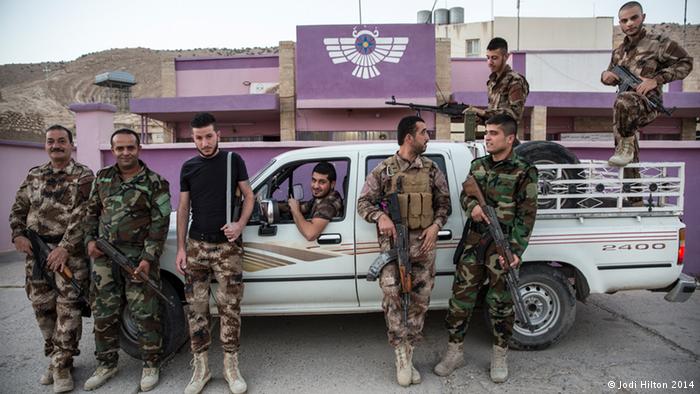
A group of Christians living in the ancient village of Al Qosh have united in an attempt to fight the Islamic State (IS), determined to protect their town from the terrorist group.
The band of Assyrian Christian militants are among a small group of fighters who remain in Al Qosh, a city of 6,000, after Kurdish peshmerga forces retreated when IS invaded a town just a few miles south.
"We had 70-80 men who stayed and stood watch on the mountain," explained the group's leader, Mrayma Mansour.
"They were from different local parties, fighters, men with guns. We were scared thieves would come."
Mrayma remembers watching the peshmerga retreat from where he stood. "I saw cars and tanks withdrawing from Tel Isqof to Dohuk," he says, "when we saw this we told our families to go because it's not safe."
However, the Christian fighters are determined to protect their town from the brutal terrorists--but they know it will be a challenge if IS chooses to invade. Instead, they reassure residents and stay alert for signs of the few remaining peshmerga retreating.
"If I see them withdrawing I know [IS] is coming so it is a good alarm," he says, adding, "If they leave us and go what can we do? [IS] will kill us without weapons."
Hemin Hawrami, who heads the Kurdistan Democratic Party's foreign relations office, said that the peshmerga forces were "outgunned" by IS, and had no choice but to retreat.
Currently, there are around 100 fighters with the Assyrian Democratic Movement, and around 2,000 volunteers ready to fight, as well as forces aligned to different Christian parties. Arms are bought privately or come from the Assyrian Democratic Movement and their supporters.
"Our artillery is far from elite, but we feel it can protect us in some small way," explains a fighter named Aban Al-harrai.
"They will buy us at least a little time if we are attacked."
Before 2003, an estimated 1.5 million Christians lived in Iraq. However, today only 400,000 remain--and many plan to leave.
"We've defended Al Qosh many times against different enemies over centuries. But right now it's impossible to defend ourselves," says Wadhah Sabih, a deacon with a local church. "The army can't stand before IS - so how can a small village? IS sold themselves to the devil."
The Christian soldiers know that if they hope to have a fighting chance to defeat the terrorist group, they must have backup.
So far, they have requested training and tactical coordination from Baghdad and Erbil as well as international protection in the form of a safe zone.
However, if international support is not given to the village, the few Christians remaining in Iraq will be forced to flee.
"I will get my passport, and family," says Mrayma, "and try to go to another country because it won't be safe here."














